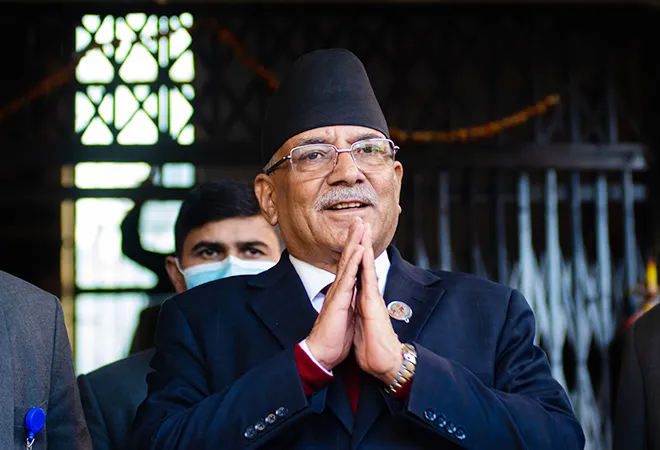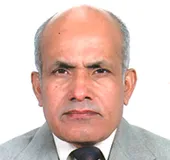-
CENTRES
Progammes & Centres
Location
A period of instability continues to loom large over Nepal as, despite the overwhelming support garnered by PM Prachanda, it won’t translate into real power
 Nepal’s Maoist leader Pushpa Kamal Dahal ‘Prachanda” received a vote of confidence in the House of Representatives (HoR), the Nepalese parliament, on 10 January after becoming Prime Minister on 25 December. He needed only 138 votes to become Prime Minister, but he got 268 votes out of 270 votes in the 275-member HoR. Only two lawmakers—one from the Nepal Majdoor Kisan Party and the other from the Rastriya Janmorcha voted against him.
It was the third time that Prachanda became Prime Minister, previously he was in this position in 2008-9 and 2016-17. With only 32 seats in the HoR, he quit the ruling alliance under Sher Bahadur Deuba-led Nepali-Congress and joined the Opposition alliance of KP Sharma Oli-led Communist Party of Nepal—Unified Marxist-Leninist (CPN-UML) in his bid to become Prime Minister.
Except on one occasion, none of the Prime Ministers in Nepal had got such historic support from almost all the quarters as Prachanda, though he was the leader of a distant third party, the Communist Party of Nepal – Maoist Centre (CPN-MC). It was by accident that he became Prime Minister when neither the single largest party, the Nepali Congress, with 89 seats nor the second largest party, the CPN-UML, with 78 seats laid claim to form the government.
Nepal’s Maoist leader Pushpa Kamal Dahal ‘Prachanda” received a vote of confidence in the House of Representatives (HoR), the Nepalese parliament, on 10 January after becoming Prime Minister on 25 December. He needed only 138 votes to become Prime Minister, but he got 268 votes out of 270 votes in the 275-member HoR. Only two lawmakers—one from the Nepal Majdoor Kisan Party and the other from the Rastriya Janmorcha voted against him.
It was the third time that Prachanda became Prime Minister, previously he was in this position in 2008-9 and 2016-17. With only 32 seats in the HoR, he quit the ruling alliance under Sher Bahadur Deuba-led Nepali-Congress and joined the Opposition alliance of KP Sharma Oli-led Communist Party of Nepal—Unified Marxist-Leninist (CPN-UML) in his bid to become Prime Minister.
Except on one occasion, none of the Prime Ministers in Nepal had got such historic support from almost all the quarters as Prachanda, though he was the leader of a distant third party, the Communist Party of Nepal – Maoist Centre (CPN-MC). It was by accident that he became Prime Minister when neither the single largest party, the Nepali Congress, with 89 seats nor the second largest party, the CPN-UML, with 78 seats laid claim to form the government.
Some lawmakers are concerned as there is no strong opposition party in the parliament. The Rashtriya Janamorcha leader Chitra Bahadur KC is disappointed at the way Prachanda got support from almost all the lawmakers. He felt that in the absence of a strong Opposition, there would be no criticism of even the misdeeds of the government, which could prove detrimental to democracy in Nepal. After winning a confidence motion in the HoR, Prime Minister Prachanda in his upbeat mood said, “Today I feel I got justice…With most of the parties supporting me, I feel both the Maoist movement and I have been justified.” He promised that he would do all that was within his might for the development of the country, though he failed to perform in the past when he was twice Prime Minister of the country. Because of the support extended by the Nepali Congress to Prachanda, there would be no Opposition party as such in the parliament. Now a situation has emerged whereby it will not be so easy for KP Sharma Oli, the leader of CPN-UML, to dislodge him from power. The possibility is that the Nepali Congress might extend him support if Oli pulls strings to dislodge him. Such developments disappointed KP Sharma Oli. Being frustrated, he said, “If Congress hopes to catch a fish by casting the net of a vote for the government, it will be disappointed.” In certain quarters, it is doubted if there is any secret deal between the Nepali Congress and the CPN-MC of which Prachanda is the chairman. Speculation is rife that due to such a deal, the Nepali Congress could get the President or even the Speaker of the HoR in near future.Except on one occasion, none of the Prime Ministers in Nepal had got such historic support from almost all the quarters as Prachanda, though he was the leader of a distant third party, the Communist Party of Nepal – Maoist Centre (CPN-MC).
Though Prachanda got overwhelming support from almost all the political parties, his path ahead does not seem to be rosy. He would have a tough time in satisfying the two rival parties – the Nepali Congress and the CPN-UML, apart from the fringe political parties. Nagarik Unmukti Party Chair, Ranjita Shrestha, has already said that her party would not join the government till all the political prisoners, including her husband Resham Chaudhary, are released. As per the constitutional provision, Prachanda is set to rule the country at least for two years as he has already won the vote of confidence in the parliament. In accordance with his deal with CPN-UML leader KP Sharma Oli, he would remain in office for the first two-and-half years and thereafter, he would have to hand it over to Oli. But Prachanda’s fate remains unknown; whatif the political party/parties that have supported him in the vote of confidence in the parliament withdraw their support even before the end of two years? Ever since the political change in 1951, the average life of a government during the monarchical period or even afterwards in multiparty democracy does not go beyond a year or so. The first communist government was formed in Nepal in 1994 under the premiership of Manmohan Adhikari. He had the backing of 202 of the 205-member parliament during the vote of confidence. But his government collapsed in just nine months. Similarly, in the 2008 elections of the first Constituent Assembly, the Maoist party led by Pushpa Kamal Dahal emerged as the largest single party. But it, too, collapsed within nine months.As per the constitutional provision, Prachanda is set to rule the country at least for two years as he has already won the vote of confidence in the parliament.
Amidst this environment of political uncertainty, it is questionable if Prachanda would succeed in addressing issues such as corruption, inflation, unemployment, liquidity crunch with the banking and financial institution, declining private investment, growing trade deficit, etc. On top of this, those figures who supported him in becoming Prime Minister for their own vested interests might not like to see that he gains any milage in addressing economic or even political issues. His popularity could dwarf the image of the next person who is likely to replace him in the second term as prime minister. Since accidental Prime Minister Prachanda’s fate hinges on several factors over which he has little control, it is difficult at least at this stage to comment as to how long and how much he can make delivery in the developmental sphere. The overwhelming support that he got during the vote of confidence for various reasons does not project his real strength. It seems that the time ahead is turbulent as political instability is likely to continue. It is also likely that the geoeconomic and geopolitical factors could pose still greater challenges to his future if not handled properly. Thus, there is only a remote possibility that he could succeed in giving a new direction to the country.Those figures who supported him in becoming Prime Minister for their own vested interests might not like to see that he gains any milage in addressing economic or even political issues.
The views expressed above belong to the author(s). ORF research and analyses now available on Telegram! Click here to access our curated content — blogs, longforms and interviews.

Hari Bansh Jha was a Visiting Fellow at ORF. Formerly a professor of economics at Nepal's Tribhuvan University, Hari Bansh’s areas of interest include, Nepal-China-India strategic ...
Read More +